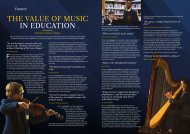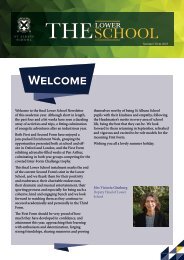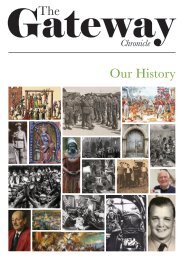Create successful ePaper yourself
Turn your PDF publications into a flip-book with our unique Google optimized e-Paper software.
7<br />
Fascist Italy<br />
around Rome with the majority not having<br />
any weapons or food- which would<br />
have required a minimal force to crush.<br />
Despite their relative weakness, due to an<br />
overestimation of their strength by the<br />
government and the speed<br />
of their assembly, no physical<br />
efforts were made to<br />
quell them. A state of siege<br />
was declared on the 28 th<br />
but was later revoked and<br />
the Prime Minister, Luigi<br />
Facta, resigned. King Victor<br />
Emmanuel then asked Mussolini to<br />
form a new government and allowed the<br />
Squadristi to conduct a victory parade in<br />
Rome. On 31 st of October, 50,000 marched<br />
through Rome brandishing an array of<br />
weapons for intimidation, while the local<br />
National Fascist Party had seized power<br />
with seemingly no physical resistance.<br />
All that Mussolini now needed to stay in<br />
control was consolidating his power. He<br />
immediately saw democracy as an obstacle<br />
to making Italy into a fascist state, only<br />
having the power of the previously incumbent<br />
Prime Ministers available to him<br />
- many of which had been unable to<br />
solve Italy’s problems as they faced large<br />
opposition. His first action to remove this<br />
problem was by passing the Acerbo Law.<br />
This changed the electoral system so that<br />
if a party gained over 25 percent of the<br />
vote then they<br />
would receive two<br />
thirds of the seats in<br />
the parliament- a<br />
system that vastly<br />
benefited the National<br />
Fascist Party.<br />
Unsurprisingly, in<br />
the following 1924 election, the National<br />
Fascist Party won 355 out of 535 seats<br />
which effectively gave Mussolini completely<br />
unchecked power. However, despite<br />
this control of the Parliament, Mussolini<br />
instead turned to the Grand Council<br />
of Fascism which he created in 1922 for<br />
governance of the country. <strong>The</strong> Council<br />
initially acted as a body for patronage<br />
within the Party (choosing the deputies<br />
for the Parliament and<br />
other local party members)<br />
but, by that time, it had effectively<br />
replaced the Parliament<br />
as the main legislative<br />
body and served to decide<br />
most other major functions<br />
of government. By<br />
1926, all rival political parties<br />
and opposition newspapers<br />
were banned, in<br />
1927 the OVRA secret police<br />
force arrested most political<br />
opponents and finally<br />
by 1928 the Grand<br />
Council of Fascism was<br />
consulted on all constitutional<br />
issues. Italy was now<br />
under the complete control<br />
of Mussolini, who appointed<br />
whoever he<br />
wanted to whatever positions,<br />
to implement his decisions<br />
on the economy and foreign policy,<br />
effectively making him dictator.<br />
“By 1926, all rival political<br />
parties and opposition<br />
newspapers were banned”<br />
Sam, L6LAB


















